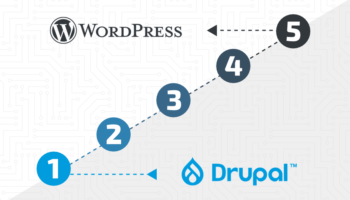WordPress Still the Leading CMS and Growing
At the State of the Word address held on December 14, 2021, the world was reminded that WordPress is still the undisputed champion powering websites.
Soaring past a 43 percent market share, the open-source phenomenon not only saw a 4 percent increase from the previous year, but WordPress left its competitors in the dust. The next company behind WP commanded only 3.1 percent of the market.
Co-founder Matt Mullenweg spoke before a live audience in New York City, though the majority of developers attended via a livestream on YouTube.
Mullenweg mentioned how he didn’t like that open source CMS are disappearing from the competition, as Shopify and Wix overtake Drupal and Joomla.
“We actually grew two entire Wixes this year, which is a new unit of measurement,” Mullenweg joked.
However, he did caution WP developers to stay humble, pointing out how WordPress may be ten times larger than the number two CMS out there, but this should never be taken for granted.
World Domination Coming via Language Packs and Courses
Another topic covered was the drive to make WordPress available in multiple languages.
Mullenweg mentioned an important part of WordPress expansion is due to the Polyglots’ work to share WordPress in more languages.
In addition, the Learn.WordPress.org site now supports 21 languages. Mullenweg dubbed this a great opportunity to grow WordPress while defining it to a new audience through courses.
There’s been a 76 percent growth in language packs for the core software over the last year for a total of more than 13,500, as well as a 28 percent increase in translations totaling around 16,000.
Mullenweg left no doubt that Gutenberg remains the primary focus of WordPress at least for the next decade. He said Gutenberg was one of the original goals of the software some 18 years ago. For Mullenweg, it’s all about helping people express themselves on the web.
The CMS pioneer said other cookie-cutter social sites just put everyone in the same box, while WordPress allows designers to get creative in their online expressions.
The Four Phases of WordPress
Mullenweg broke down the WordPress journey into four phases, starting with “Easier Editing” in 2018, then “Customization” in 2019, which continues today through the unveiling of WordPress 5.9 in early 2022. The “Collaboration” phase is slated to begin in 2023 and the fourth, “Multilingual Phase” is underway now but with no end date yet specified.
WordPress 5.9 will be the “MVP” of this customization phase, said Mullenweg, to fully realize the goal that began in 2019. It was emphasized that WordPress is just beginning its journey with Gutenberg.
The third phase, “Collaboration,” is expected to happen in 2023 so that enough time is spent on the Customization phase. In this collaborative phase, the focus will be on sharing projects with developers, even outside the WordPress environment. An example is a collaborative writing project where a link from WordPress is shared to other users, allowing them to edit the piece without actually logging into the dashboard.
The fourth phase of WordPress is the “Multilingual Phase,” which is already underway and seeing good progress, though no official completion date has been set for this phase. This final phase includes the advances with language packs and courses that are helping to deliver WP to international audiences.
Diving Into Openverse
Finally, Mullenweg introduced the audience to the Openverse project. The search engine for media that’s openly licensed is now live.
He said the purpose is to give creators more control over their content while allowing people to share creations and make cool stuff together.
He also unveiled the new WordPress.org Photo Directory, which hosts imagery that can be used on any site, whether business or personal.
Mullenweg encouraged creators to make their work available in the Openverse, as well as to keep supporting other endeavors like Gutenberg through patterns and block themes. Someday WordPress users will be able to add works from the Openverse into their content from the dashboard.
Takeaway
All in all, WordPress is not only here to stay, but growing quite robustly.
To dive in deeper to the State of the Word, check out WPTavern’s coverage and WordPress’s official summary. If you’re looking to enhance or build a WordPress site, contact the WordPress experts here at Hall.





